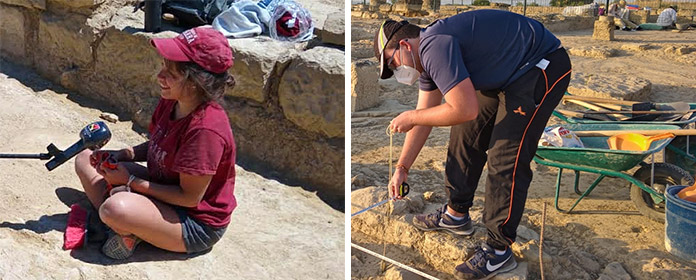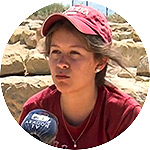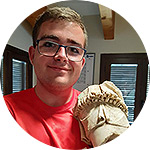2020_08_03_FYL_noticia_los_bañales
Students from the University's School of Philosophy and Letters participate in the 12th excavation campaign at Los Bañales.
Thanks to a scholarship granted by the Comarca de las Cinco Villas they have been able to carry out practical work experience at one of the most important Roman sites in Aragon.

Twenty students of the Degree in History and the Diploma in Archaeology of the School of Philosophy and Letters of the University of Navarra have participated in the XII excavation campaign of the Roman site of Los Bañales, one of the most important of Aragon and the northeastern peninsular. contact For the fourth consecutive year, the Comarca de las Cinco Villas has granted them a scholarship that has allowed them to be in close contact with History and to put in internship the knowledge acquired in the classroom.
"The training of students has always been essential in the project of the Uncastillo Foundation. Due to status health, this year fewer students than usual have passed through here. In total, we have had 30 students, mostly from History; Art History; and History and Archaeology, from different universities in the country," said Javier Andreu, director of Diploma in Archaeology of the academic center, who has accompanied them in the work.
These works have led to important findings, among others, "traces of the great urban development of the city in the time of Augustus, including the wall that would close, as an element of prestige, the city on its north side," as well as "evidence of a B remodeling of urban space towards the end of the first or early second century AD. It is in this context where it has appeared, among other things, a staircase communicating a courtyard with a lower floor of one of these houses. In another, two adjoining rooms have appeared and in one of them we have discovered a collapse of the mural painting that decorated the jambs and the lintel of the door, probably dating from the second century. We have also found a large storeroom on the western flank of the excavated area, which demonstrates the great transformations that the city underwent during this period," explained Professor Andreu.
 María José Beltramo2nd year student of History from the School of Philosophy and Letters, has witnessed these findings. For the second year, he is participating in the excavation campaign, "because is a very enriching experience and I didn't want to miss it this summer either. On an academic level, I now value more and understand the heritage better. On the staff level, as we have the opportunity to meet students from other universities, different ages and varied experiences, very interesting topics arise and we learn twice as much. In addition, it is very pleasant and generates a very family-like atmosphere," he adds.
María José Beltramo2nd year student of History from the School of Philosophy and Letters, has witnessed these findings. For the second year, he is participating in the excavation campaign, "because is a very enriching experience and I didn't want to miss it this summer either. On an academic level, I now value more and understand the heritage better. On the staff level, as we have the opportunity to meet students from other universities, different ages and varied experiences, very interesting topics arise and we learn twice as much. In addition, it is very pleasant and generates a very family-like atmosphere," he adds.
He explains that, thanks to Archaeology, "I have been able to experience another way of reconstructing historical events and processes without having any text subject . The sources we deal with do not involve words and this does not mean that they contain less information, on the contrary, they convey the context in which people lived at the time. It is something that has to be lived". He assures that during this time, the theory studied at class has been useful for him to learn the different methods and procedures of an excavation: "The internship seems fundamental to me, because it is where you apply everything you have learned and see first hand the possible casuistry. With Lorena, the archaeologist who this year guide us in the campaign, we have understood how theory and internship go hand in hand and the importance of each one to have good results and to be able to classify and date the materials and Structures". In his case, he has been able to apply the knowledge acquired in the classroom by participating in the excavation of three sectors of the site, in the taking of dimensions, the technical drawing on the relief, as well as in the essay of the excavation diary and the cleaning of the material in the laboratory. "It's a team work ," he points out.
To the Comarca de las Cinco Villas that, thanks to the scholarships it grants, has allowed him to participate in the campaign for another year, he thanks them "not only for helping to preserve and discover our heritage, but also for giving us the opportunity to learn and grow with an experience like this. With this gesture, there are many beneficiaries, and that is one of the sides of Archaeology that I like the most; it is an opportunity to bring out the best in everyone".
 Javier Martínez Sarasatestudent from 2nd year of History and Diploma in Archaeologyagrees with his colleague when he says that "with these scholarships, students like me can participate and live in first person an authentic archaeological experience and learn from it". For him, this has been his first campaign in Los Bañales. "I was encouraged to sign up for this project because, as a lover of History and Archaeology, I have always wanted to participate first-hand in an excavation and thus learn about work at a site and the methods and techniques to be carried out". He assures that this experience has been very positive: "On a methodological level, I have learned the techniques that are applied, the daily work , the different materials and situations you have to deal with... As for staff, I have met other young people who share one of my passions and that is very enriching".
Javier Martínez Sarasatestudent from 2nd year of History and Diploma in Archaeologyagrees with his colleague when he says that "with these scholarships, students like me can participate and live in first person an authentic archaeological experience and learn from it". For him, this has been his first campaign in Los Bañales. "I was encouraged to sign up for this project because, as a lover of History and Archaeology, I have always wanted to participate first-hand in an excavation and thus learn about work at a site and the methods and techniques to be carried out". He assures that this experience has been very positive: "On a methodological level, I have learned the techniques that are applied, the daily work , the different materials and situations you have to deal with... As for staff, I have met other young people who share one of my passions and that is very enriching".
This summer, the students participating in the excavations were divided into two groups: the first group worked from July 1 to 15. The other group worked during the second half of the month. It is in this team where Javier has had the opportunity to apply the knowledge acquired at classroom. He assures that with this Degree "you learn a lot of very useful theory, which serves as a basis for the field work ". He adds that "this Diploma financial aid togo deeper into the world of Archaeology through the study and the activities that are organized. In the excavation, everything you learn you can touch or see with your own eyes, put on internship that knowledge and understand it much better. That is why I think that studying the Degree of History with the Diploma of Archaeology is a great success".
Asked about some curious anecdote experienced during these days, he tells amusingly that the first day of excavation, after several hours of work, we heard shouting "Coin!": "It seemed incredible to us and we went running there. I thought it might be another coin like the one of Emperor Domitian, found in the previous batch, but in this case it was not a Roman coin but a pre-Latin coin and this disappointed us a bit. Then we took heart because, after all, we had found an ancient coin, important for reconstructing the history of the city."

